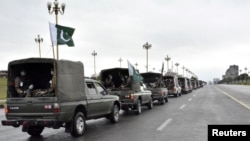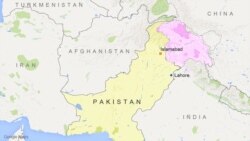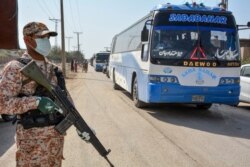Officials in Pakistan Tuesday confirmed the country’s first coronavirus case among thousands of inmates in an overcrowded prison facility, saying the person had been arrested on drug charges in Italy before his recent deportation.
Italy has suffered by far the deadliest consequences of the pandemic, reporting more than 6,000 deaths and has the second highest overall number of infections.
The prisoner with coronavirus was being held at the central jail in Lahore, the capital of Pakistan’s most populous Punjab province, which houses around 3,500 inmates.
An official at the Lahore General Hospital told VOA by phone the patient had been swiftly shifted to an isolation ward for treatment and prison authorities had been ordered not to move inmates to the detention center before undergoing tests for the virus.
It was not immediately clear how many other inmates and prison staff were inadvertently exposed to the disease.
Prisons could become 'epicenters'
Local and international rights groups have been urging Pakistani authorities to take preventive steps, including social distancing, in the country’s jails, which house more than 77,000 prisoners.
“Prisons in Pakistan face massive overcrowding, overruling the possibility of social distancing, with the potential for a large outbreak. Hygiene supplies remain limited as does healthcare,” said Amnesty International in a statement.
Amnesty noted that pre-trial detainees are taken to courts, where they may be exposed to the virus. The rights group has demanded that Pakistani authorities seriously consider reducing the prison population.
“Should the government fail to act now, Pakistani prisons and detention centers will become epicenters for the transmission of COVID-19,” said Sarah Belal, executive director of Justice Project Pakistan, a non-governmental group working for prisoners’ rights.
Cases linked to Iran
Pakistan said Tuesday the nationwide number of COVID-19 infections has risen to more than 900, including six deaths. Around half of the cases are located in southern Sindh province. One diplomat at the U.S. embassy in Islamabad has also tested positive for symptoms of the disease.
Health Minister Zafar Mirza told a nationally televised news conference that experts have also established that 78 percent of the country’s confirmed cases are Shi’ite Muslim pilgrims who recently returned from visiting religious shrines in neighboring Iran.
Iranian officials have reported the virus has killed up to 2,000 in their country and infections surged to nearly 25,000. Around 5,000 Pakistani pilgrims and students are still stranded in Iran and expected to return home in coming days, officials say.
Mirza said that around 7,800 suspected patients were waiting or undergoing tests for the virus, suggesting the number of cases could increase further.
Troops deployed
Pakistan called in troops on Monday to help civilian authorities in dealing with the coronavirus pandemic as the country remains under a partial lockdown, with educational institutions, public gatherings and wedding parties banned.
All international incoming and outgoing passenger flights also have been halted until April 5, with Pakistan’s borders with Afghanistan, Iran, India and China temporarily sealed.
Only hospitals, grocery stores, food and pharmaceutical producing factories and pharmacies are working. Inter-city transport is allowed only to move food and medical supplies while public transport inside the cities is prohibited.
Prime Minister Imran Khan, however, has ignored domestic calls for a total lockdown, saying such a curfew-like move would endanger tens of millions of lives of working class and poverty-stricken families in Pakistan.






